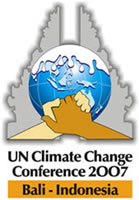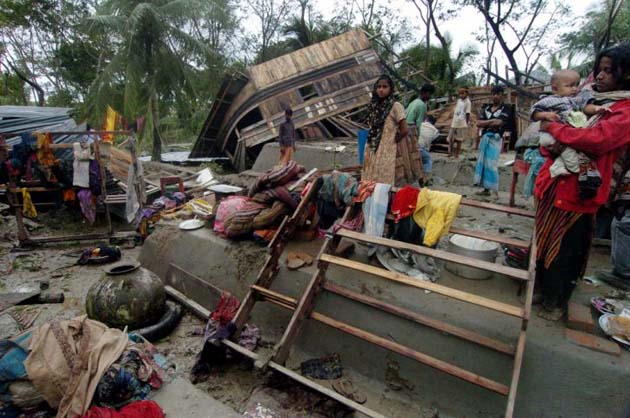
This blog has been created, by Mr O'Callaghan to share Geography online resources and websites with the Geography students of Kingdown Community School Warminster Wiltshire.
Friday, 28 December 2007
Wednesday, 26 December 2007
Tsunami homeless three years on

More than 40,000 people in India's Andaman and Nicobar Islands made homeless by the 26 December 2004 Asian tsunami are still living in temporary shelters.
Link to BBC NEWS | World | South Asia | Tsunami homeless three years on
The Big Question: Three years on from the Boxing Day tsunami, have the countries recovered?
Sunday, 23 December 2007
World Capitals: We reveal the greatest city on earth - Independent Online Edition

Welcome to World Capitals, where we explain our methodology to determine a league table of great cities.
The information is in three parts. First, “World Capitals – How We Did It” explains the criteria chosen and the sources used (together with any deficiencies we identified in the data). It describes the formulae applied to the data – in other words, the weighting we gave to every piece of information. And it points out drawbacks with each criterion that may favour particular locations.
Link to World Capitals: We reveal the greatest city on earth - Independent Online Edition > News & Advice
Thursday, 20 December 2007
Wednesday, 19 December 2007
Green light for long-haul scampi?

It sounds mad: shipping UK-caught langoustine thousands of miles to be processed, then back again to be turned into breaded scampi and put on sale.
That's what leading seafood producer Young's started doing last year, triggering a storm of protest from environmental campaigners. They called the huge journey another example of food mile madness.
Link to BBC NEWS | UK | Green light for long-haul scampi?
Monday, 17 December 2007
Sustainable food

Link to BBC NEWS | Science/Nature | Quick guide: Sustainable food

Shopping lists 'get more ethical'
Carbon cost of Christmas dinner
Sunday, 16 December 2007
Global Change and Environmental Hazards
How Do Societies Respond and Adjust to Environmental Hazards?

Link to Global Change and Environmental Hazards
Climate deal sealed by US U-turn

Delegates at the UN summit in Bali have agreed a deal on curbing climate change after days of bitter wrangling.
Link to BBC NEWS | Science/Nature | Climate deal sealed by US U-turn
Bali at a glance
More questions than answers

UNFCCC
Thursday, 13 December 2007
Wednesday, 12 December 2007
Five carbon lives

How much of a country's emissions are down to the way its people live? Countries like China and India may be among the world's worst CO2 emitters - but a great many of their citizens' carbon footprints are very small. Use the links below to meet ordinary families in the USA, UK, United Arab Emirates, India and China and get a glimpse of their carbon lives.
Link to BBC NEWS | Special Reports | 629 | 629 | Five carbon lives
Sunday, 9 December 2007
Saturday, 8 December 2007
Monday, 3 December 2007
Sustainable Aviation - Home

Sustainable Aviation is a long term strategy which sets out the collective approach of UK aviation to tackling the challenge of ensuring a sustainable future for our industry. A world-first, Sustainable Aviation was launched in 2005 and brings together the main players from UK airlines, airports, manufacturers and ATM providers. We published our first Progress Report in 2006
Link to Sustainable Aviation - Home
Sunday, 2 December 2007
Thursday, 29 November 2007
BBC NEWS | UK | The high price of low-cost airlines

Cheap flights could be about to get cheaper still, thanks to Easyjet's bargain deal for 120 new aeroplanes. But not everyone's happy - cut-price air travel is costing the Earth dear.
Source: BBC NEWS | UK | The high price of low-cost airlines
Choose Climate: Flying Off to a Warmer Climate

Maybe you're visiting old friends or bringing some warmth to your grandchildren far away,
Or are you jetting off to an business meeting or an international conference, to play your part in shaping the future of our planet?
Yes, that's right, whatever your reason, all you have to do to make the world warmer is get in a plane!
CO2, NOx, and H2O emissions from aircraft contribute substantially to the greenhouse effect. So, as this melts the icecaps, the sea-level will rise, drowning those coral islands, flooding those forests, perhaps bringing the waves right into your bedroom. Meanwhile advancing deserts and freak storms may destroy our farms and cities. Will our grandchildren thank us for the exciting warm world they inherit?
Flying is also the cheapest way to cook the planet -it's tax-free!. But it's still your choice, there are alternatives, you don't have to fly. Explore the links on this page
![]()
![]()
![]()
![]()

Monday, 26 November 2007
BBC News Player - Climate disasters 'on rise'
The number of weather-related disasters has quadrupled over the past 20 years, according to Oxfam
Link to BBC News Player - Climate disasters 'on rise'
Friday, 23 November 2007
Global Disaster Watch - Natural Disasters
CURRENT WORLDWIDE NATURAL DISASTERS
(Hannah Walters )
Warnings and updates for:
drought, earthquakes, flooding, hurricanes, landslides, meteor
showers, severe weather warnings, solar flares, tsunamis,
volcanoes, wildfires, plus disaster archives and record-breaking
disasters.
Link to Global Disaster Watch - Natural Disasters
Thursday, 22 November 2007
Heathrow expansion plans unveiled

Transport Secretary Ruth Kelly has set out proposals for a third runway and a sixth terminal at Heathrow.

Link to BBC NEWS | Politics | Heathrow expansion plans unveiled
Sunday, 18 November 2007
Bangladesh Cyclone disaster toll climbs
The government said around 1,700 people had died, but that toll might rise as aid workers, helped by ships and military helicopters, battle to reach hundreds of villages cut off by the damage. Power and phone lines were knocked out by heavy rains, slowing down relief efforts and making the full scale of the disaster difficult to estimate.
While acknowledging that the final death toll could be much higher, there was relief among many that the disaster had not killed more. In 1970 between 300,000 and half a million people died in a cyclone and Thursday's storm was as strong as a 1991 cyclone which killed around 140,000.
Because Bangladesh is known to be so vulnerable, the government and NGOs have devised cyclone preparedness programmes, building shelters, organising simulated cyclone evacuation exercises and educating villagers in the most exposed areas on how to flee. Efficient early warning systems and the widespread use of mobile phones meant that this time even people in remote regions were aware of the impending disaster.


Link to Cyclone disaster toll climbs | World | The Observer
BUY NOTHING DAY - Saturday November 24th 2007

To buy, or not to buy, that is the question.
Saturday November 24h 2007 is Buy Nothing Day (UK), It's a day where you challenge yourself, your family and friends to switch off from shopping and tune into life. The rules are simple, for 24 hours you will detox from consumerism and live without shopping. Anyone can take part provided they spend a day without spending!
Link to BUY NOTHING DAY - Saturday November 24th 2007
CHINA NOW - Secondary Education

Opportunities For Secondary Schools
CHINA NOW has opportunities and grants for UK secondary schools that wish to develop new or existing relationships with China.
Link to CHINA NOW - Secondary Education
Saturday, 17 November 2007
Food Miles and Food Miles Calculator - Organic Linker - Organic and Eco Web Directory
Food Miles Calculator
1. Choose the country where tyhe food is from.
2. SUBMIT
3. Calculates the miles as the crows flies.
4. Provides a google earth map with stright line distance
5. Calculates carbon footprint
i.e.
If this distance was covered by an Aeroplane that would create approximatly 3061 kgCO2 or 836 kg Carbon
If this distance was covered by a Car that would create approximatly
3799 kgCO2 or 1037 kg Carbon
If this distance was covered by a Train that would create approximatly
1055 kgCO2 or 288 kg Carbon
Link to Food Miles and Food Miles Calculator - Organic Linker - Organic and Eco Web Directory
Press Articles - Food Miles
Food miles are big in the food aisles.
In early September, home-grown seasonal fruit and vegetables like apples, onions, carrots and green beans were available throughout the country. But so too, in three central London supermarkets, were apples 4,700 miles from the USA, onions over 12,000 miles from Australia and New Zealand, carrots from South Africa (51,000 miles) and beans from Kenya (3,600miles).
Link to Press Articles - Food Miles
Farmers Weekly Food Miles

What is a food mile?
A: It’s how far food travels from the farmer who produces it to the consumer who eats it. That includes the journey from farm to processor, then from processor to retailer and finally from retailer to consumer. It includes travel within the UK as well as between countries.
Link to Farmers Weekly Food Miles
BBC - Food - Food matters - Food miles

Put simply, food miles are the measure of the distance a food travels from field to plate. Agriculture and food now account for nearly 30 per cent of goods transported on our roads.
Link to BBC - Food - Food matters - Food miles
Go green this C******** (C-word)
A guide to a greener C__________
Decorations
Perhaps the most heinous Christmas crime against the environment (and good taste) is the fad for draping every square inch of the outside of your home in lights. Sales of external lights have rocketed by more than 500 per cent over the past five years, and households that go to town with extravagant outdoor displays are adding an extra £75 to the cost of their Christmas festivities, and producing CO2 emissions equivalent to a 2,000km car journey. "Indoor lights use less energy than outdoor ones so try to keep outdoor lights to a minimum," says McLaren. Opt for LED lights which last ten times longer, produce virtually no heat and dramatically reduce power consumption. Also, fit your lights with a timer so that they go off by midnight."
Tree About seven million Christmas trees are grown in the UK each year, but only one in six is recycled. Real trees are a much greener choice than artificial ones, with Christmas trees absorbing five million tons of CO2 every year in the UK. And since artificial trees are only used for an average of six years, the most carbon-neutral option is to plant an evergreen in your garden that you can pot and bring indoors every year.
"Artificial trees consume significant energy during their manufacture, and are usually made in China, requiring them to travel thousands of miles to get to the UK, resulting in yet more carbon emissions," says Roger Hay, secretary of the British Christmas Tree Growers Association. "In addition, artificial trees are non bio-degradable, so buying a real tree is a much more environmentally friendly option."
Cards and wrapping
A terrifying one billion cards end up in bins across the UK after Christmas, alongside 83km sq of wrapping paper. "Open wrapped gifts carefully so you can re-use the paper, or try using imaginative alternatives to wrapping paper, like newspaper or magazine pages," says McLaren. "Buy recycled cards from your favourite charity or make your own cards and gift tags from the ones you received last year, and save your envelopes and recycle them with re-use labels, available for £2 for a pack of 50 from www.foe.co.uk," he says. E-cards, Christmas cards sent via e-mail, are useful if you hate hassle, and they're free and eco-friendly. Type "e-cards" into a search engine and take your pick. If you receive cards from others, cut the stamps from the envelopes leaving a 3mm margin, and send them to Save the Children, The Stamp Department, 17 Grove Lane, London, SE5 8RD to be recycled.
Food and drink
With around 4,000 million Brussels sprouts bought in the week before Christmas, we are more likely to over-buy food at Christmas than at any other time of the year. The average family will throw away around one-third of the festive food they purchase, so plan your Christmas menu carefully to avoid waste. If anything does remain, you can put your vegetable leftovers in a compost bin, available for £4 (www.recyclenow.com).
When you're stocking up, buy loose rather than pre-packed vegetables, which will help cut down on waste packaging, and steer clear of goods which involve complicated mixed-material packaging such as card and cellophane, which can make recycling difficult. If you're having a party, avoid serving food and drink on disposable plates and cups. Borrow extra crockery from neighbours and hire boxes of glasses from your local wine shop. Oddbins offer a free glass-hire service when you buy your wine or Champagne from them (0800 917 4093, www.oddbins.com).
"The traditional Christmas dinner is relatively eco-friendly as it uses seasonal British produce like sprouts, carrots and potatoes," says Hugh Raven, director of the Soil Association Scotland. "However, your Christmas meal could have travelled 49,000 miles to reach your plate, releasing around 37kg of CO2, so try to reduce your food miles by buying from local suppliers, a move that will also help your local economy. Where possible, you should also look out for fair trade and local organic produce. A bar of Green & Black's chocolate is organic, fair trade and delicious, and you can't get much better than that!" Visit www.soilassociationscotland.org for organic farmers and growers near you.
Travel
Nearly two million Britons will go abroad this Christmas, creating millions of tons of CO2 in the process. Millions more will drive hundreds of miles to visit relatives and friends. If you do want to get away, try consulting Organic Places to Stay in the UK (£10.95) from www.greenbooks.co.uk, which lists small hotels and B&Bs that are dedicated to using organic, locally grown produce.
Presents
Remember that buying products that have recycled contents is just as important as actually recycling. The Recycled Products Guide is a directory of products made from recycled materials (www.recycledproducts.org.uk). To ensure that you don't give your hard-earned cash to unethical brands, you can also check www.thegoodshoppingguide.co.uk
"I save money and reduce consumption by mutually agreeing with my family to set a price limit of £10 on all Christmas gifts," says Green MSP Shiona Baird. "I then buy most of my gifts in charity shops, but eBay, flea markets, and antique shops are also great for finding unique presents. Oxfam have lovely fair trade wooden toys and games and I'll be snapping some up for my grandchildren. You can also give gifts that require little or no wrapping, like theatre tokens, membership of a museum or a day at a spa."
Recycle
More than half of the waste produced by households at Christmas could easily be recycled, but around 90 per cent will end up in the dustbin. Nearly three million extra tons of waste are dumped in the UK over the Christmas period, and our bins overflow with an extra 750 million bottles and 500 million drinks cans. We also throw out 80,000 tons of old clothes each Christmas, as we update our wardrobes. Tackle this problem head on by remembering the three "Rs": reduce, reuse, recycle. For your nearest recycling facilities, visit www.sort-it.org.ukAs for unwanted gifts, that adds up to an annual £1.2 billion. So instead of binning the naff jersey your granny bought you, donate it to a charity shop. Oxfam accepts clothing, music, books and bric-a-brac. You can drop items off in one of their 700 shops during opening hours, or you can post them into one of their donation banks (0870 333 2700, www.oxfam.org.uk).
Link to Scotsman.com Living - Go green this C________
Friday, 16 November 2007
Going local

As hundreds continue their protest against expansion plans at Heathrow Airport, what about the dozens of smaller airports around the UK growing at a faster rate?
Link to BBC NEWS | Magazine | Going local
Wednesday, 14 November 2007
BBC NEWS | In Depth | US illegal immigrants

An estimated 11.5 - 12 million foreign nationals are living illegally in the US, according to the Pew Hispanic Center.
Link to BBC NEWS | In Depth | US illegal immigrants
Monday, 12 November 2007
BBC NEWS Climate scepticism: The top 10

What are some of the reasons why "climate sceptics" dispute the evidence that human activities such as industrial emissions of greenhouse gases and deforestation are bringing potentially dangerous changes to the Earth's climate?
















